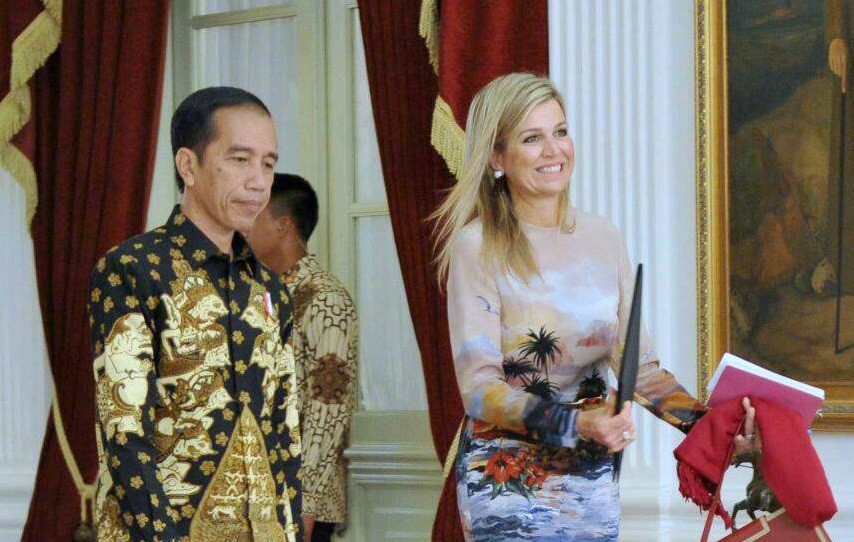Popular Reads
Top Results
Can't find what you're looking for?
View all search resultsPopular Reads
Top Results
Can't find what you're looking for?
View all search resultsUsing fintech to improve Indonesia’s financial inclusion
Change text size
Gift Premium Articles
to Anyone
I
ndonesia was recently visited by Dutch Queen Maxima in her capacity as the UN secretary-general special advocate for Financial Inclusion. As for the purpose, financial inclusion has been a pressing global issue in the past decade, where Indonesia is not exempt.
With only around 36 percent of Indonesians connected to formal financial institutions, the inclusiveness of our financial sector needs to be improved to create a sound and strong financial sector.
Looking at the country’s geographical landscape, accessibility becomes important, especially for people in remote areas and on small islands, and also for the poor and vulnerable. One of the means to bridge this is by using financial technology (fintech) to help the “unbanked” population become bankable with branchless-banking and digital financial services.
Although the history of financial provision dates back more than 100 years ago, the unbanked population in Indonesia is still large. With 203 million or 81.5 percent of the country’s population living at the bottom of the economic pyramid, those who are living in poverty need access to financial services in order to find opportunities to improve their lives and their communities.
But looking at the country’s current demographic, geographic and social-economic condition, there are still several boundaries that make Indonesians reluctant to go to the bank. Geography has also caused unequal branch distribution across the region.
On top of that, one of the fastest and most efficient ways to bridge the challenging physical infrastructure gap is by developing metadata infrastructure and innovations that can help accelerate achieving this goal.
The government sees that branchless banking and digital financial service schemes with mobile-based agents need to be developed.
On the regulatory side, both Bank Indonesia and the Financial Services Authority (OJK) have issued a regulation on electronic money through a digital financial service (LKD) and branchless banking (Laku Pandai), which provides legal certainty and consumer protection.
The mobile-based banking agent model can solve infrastructure problems as well as social demographic problems. The poor and vulnerable, for instance, need assistance from somebody who understands the system and the products. This group also needs to talk to a person that they trust for cashing-in money to the system.
The type of agents can also be tailored or placed to fit the needs based on the demographic and/or economic behaviors (e.g. students, farmer, fisherman, housewives). It also allows the government-to-people (G2P) social welfare distribution program to be disbursed in non-cash form more efficiently.
Non-cash G2P disbursement will also help increase financial inclusion as it incentivizes G2P recipients to save part of their money as savings or e-money as a part of the strategy, provide financial access to G2P recipients who most likely come from the unbanked demographic and reduce queuing because G2P recipients can withdraw their money anytime.
The government’s e-commerce road map that was launched earlier this year will also further boost this initiative. The road map involves key issues, such as logistics, communication infrastructure, cyber security, consumer protection and investment funding. It is broken down into a series of more than 30 initiatives to encourage the development of e-commerce and digital businesses.
To promote the national digital economy, the government also has provided opportunities through investing and observing the digital ecosystem that, in turn, can also help fintech to grow.
However, several issues concerning the program’s foundations need to be sorted out.
The benefit of financial inclusion should be socialized and financial literacy or education is essential to understanding how the products work, especially because the financially disadvantaged and vulnerable mostly have a lower educational background.
Easy-to-adapt products need to be developed to meet society’s need, without overlooking further product developments in the future. Banking agents also need to be prepared to handle different kinds of basic transactions, yet remain reachable to the beneficiaries.
Infrastructure, especially utilized by the telecommunications industry, must adapt to these changes fast as the system needs reliable communication services and SIM card availability as a basic need.
The government has recently encouraged a decrease in interconnection fees with the aim to provide efficiency and sustainability of the telecommunications sector.
In terms of customer services, the government hopes to cut interconnection costs so as to lower collection rates for services between providers without reducing the quality of service. This will benefit the fintech industry and consumers on a larger scale.
The country also needs to adapt to new technologies that encourage all layers of society to have savings accounts, faster transaction payments, access to credit, insurance and investment tools, as well as remittances for our migrant workers.
As banks and telecom operators play the two most important roles in developing the electronic money business, both parties need to see the advantages in combining their strengths to create and deliver mobile financial services that are most appropriate for their respective customers.
With so many stakeholders involved in the fintech business, collaboration is a must although this might mean giving up part of each party’s bargaining power. However, good political will is also needed, as one of the end goals of developing fintech is to rapidly increase the country’s financial inclusion rate.
-----------------
The writer is a researcher at the Mandiri Institute, an independent research think tank of Bank Mandiri that focuses on the financial and banking sector and public policy.










